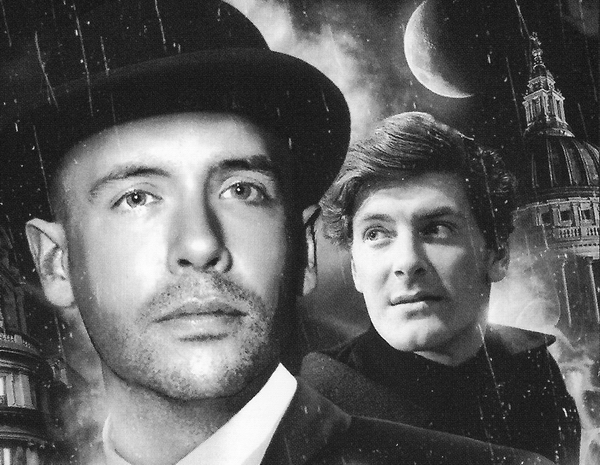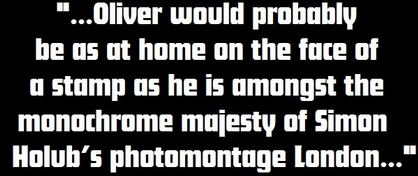|
| ||
|
WRITTEN BY SIMON GUERRIER
DIRECTED BY LISA BOWERMAN
RECOMMENDED PURCHASE BIG FINISH 'COMPANION CHRONICLES' CD 5.08 (ISBN 1-84435-506-8) RELEASED IN FEBRUARY 2011.
BLURB When the TARDIS materialiSes in a familiar junkyard in the 1960s, the Doctor and Steven are soon embroiled in a mystery in the City of London. Who are the mysterious bowler-hatted businessmen with their deadly umbrellas? And what secret is young Oliver Harper desperately trying to conceal?
Contracts have been signed. A deal is in place. And the Doctor discovers that perhaps not even he can stop a terrible business... …
|
| |
|
|
| |
|
The Perpetual Bond FEBRUARY 2011 (2 EPISODES)
1. THE PERPETUAL BOND 2. FAIR TRADE
The Perpetual Bond is the latest in a long line of Companion Chronicle firsts for Big Finish. Littered amongst more formulaic releases have been double-length treats, two-hand audio dramas, stories told by non-companions, stories starring an actor who’s played the Doctor; even stories that don’t feature the Doctor in any way, shape or form. It could be argued though that this release is the most significant Companion Chronicle oddity of them all; the apotheosis of all of the aforementioned departures. Why? Because it creates a new companion – and an alluring one at that.
The brainchild of producer David Richardson, Oliver Harper makes for an intriguing addition to the companion ranks. He hails from a place and time so very vivid that he’s very nearly a literary stereotype. Every bit the bowler-hat doffing, brolly-wielding, public school-educated Brit icon, Oliver would probably be as at home on the face of a stamp as he is amongst the monochrome majesty of Simon Holub’s photomontage London. However, whereas the Doctor Who of 1966 would probably have settled for that, Richardson gives Oliver a much sharper, stubblier edge; one that has the listener speculating about his history and his motives even before the title music has kicked-in. Why are the police coming for him? What’s his crime? And what would have become of him, but for the Doctor and Steven’s timely arrival?
Cast in the part of Oliver is comedian and writer Tom Allen, who is perhaps best known for his portrayal of young Pip Bin in BBC Radio 4’s 2007 adaptation of Bleak Expectations. I can see why he was the producer’s “first and only choice” for Oliver – the voice that he gives to him is almost quintessentially genteel, embodying all the refinement and pretension that one would expect from someone with his (apparent) background, but none of the savoir-faire needed to survive for long in the Doctor’s company. In this respect he couldn’t be any further away from Peter Purves’ unassuming Steven, which inevitably gives rise to a wonderfully capricious dynamic between the two of them. In one scene, they are marching out into town in their suits and bowlers - Oliver the striding, pigeon-chested King, and Steven his clumsy servant. In another, Oliver is incredulously babbling, posing questions that even some of the Doctor’s most-derided assistants would have thought twice about, while Steven remains as stoic and as dependable as ever.
I can’t praise the performances of Allen and particularly Purves enough. Not once did it occur to me that I was listening to a man in his twenties and a man in his seventies; I was listening to two twenty-something men wrapped up in a scintillating adventure featuring ancient time travellers and mushroom-headed monsters. I wouldn’t go so far as to say that this production could pass for full cast drama, but with Allen’s modulated Fulgurites and Purves’ convincing Doctor, it is at least the equivalent of a four-hand play.
Guerrier must also be credited for the redolence of his script. Neither An Unearthly Child nor Remembrance of the Daleks truly evoked the “swinging ’60s” vibe, as the 60s hadn’t really started swinging by the winter of ’63. However, much like The War Machines, The Perpetual Bond really feels like the 1960s as people tend to remember them, and the real beauty of it is that Guerrier gets this across by setting his story at the opposite end of the stratosphere to that so often rehearsed in drama. The ’60s are there, swinging away in the background, but the listener is looking at them through the eyes of flamboyant stockbrokers rather than long-haired hippies and stoners. This feeling is reflected in Lisa Bowerman’s direction and particularly Richard Fox and Lauren Yason’s sound design, which leans more towards the films of the period than it does its social movements (save for a bout of Fab Four humming, cunningly capped after the opening few bars of “All You Need is Love” so as to avoid any copyright entanglements).
On balance though, the thing that I like most about this story is its atypical grounding. Law is my day job, and so I know all too well how arid it can be, yet the intricacies of indenture and the complexities of “reasonableness” and “fairness” form the basis of this story’s gripping plot. Guerrier’s script casts the Doctor as a lawyer as much as it does a scientist or hero, stringing along the Fulgurites with his sly counsel while his two young friends rally against them. It’s a real joy to hear William Hartnell’s Doctor back in a Keys of Marinus-type role again. As he clasps those lapels and puts forward his representations, it’s hard to imagine a more forceful advocate.
Overall then, The Perpetual Bond is a real winner, and I can’t wait
to hear this summer’s follow-up release, The Cold Equations. A
three-strong male TARDIS crew might not sound all that appealing on paper,
but in practice it’s very exciting indeed.
|
||
|
Copyright © E.G. Wolverson 2011
E.G. Wolverson has asserted his right under the Copyright, Design and Patents Act 1988, to be identified as the author of this work. |
||
|
Part 1 of this story features a reprise of the closing moments of Destruction of Time, the final episode of The Daleks’ Master Plan. This means that the short story Roses, which dates the first Doctor’s role in The Five Doctors to between The Daleks’ Master Plan and The Massacre, must take place after The Perpetual Bond and the two stories that follow it. We have therefore placed this trilogy and The Five Doctors accordingly.
|
||
|
Unless otherwise stated, all images on this site are copyrighted to the BBC and are used solely for promotional purposes. ‘Doctor Who’ is copyright © by the BBC. No copyright infringement is intended. |
||

.jpg)
.jpg)

